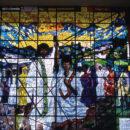Urbanization and the Future of Sudan–New Perspectives
Munzoul Assal has provided an useful and provocative analysis of urbanisation in Sudan and its social and political implications. In response, Asif Faiz has provided a different inflection. Taken together, they usefully mark out what is at stake in this discussion. In developing this idea, I want to begin by adding to the views of Munzoul.
The rapid urbanisation that is underway in Sudan is a further demonstration of the proposition, well known in progressive circles, that progress is negatively correlated with social welfare. Since the colonial period in Sudan, it is possible to document the incremental degradation of those once autonomous social ecologies of survival and resistance usually referred to as the ‘tribe’. The loss of local handicrafts through cheap imports, the decline in nutritional standards resulting from cash-cropping, the loss of farm and grazing land and the evisceration of cultural integrity were underway before independence. While this process has differed in terms of speed, intensity and geographical location — on occasion even being slowed down or diverted — the toll of progress upon the peoples of Sudan has been relentless.
In Europe, the proposition that progress is negatively associated with social welfare has long been axiomatic among policy makers. Not least, it gave us the welfare state, the founding principle of which is that in the normal course of living people will loose their jobs, people will become sick, people will have accidents and people will grow old. In meeting these normal contingencies of life, insurance-based welfare bureaucracies and safety-nets became the norm within mass consumer societies. Colonial administrations, however — and Sudan is typical — never developed such welfare bureaucracies. In a practice that has largely been continued since independence, they related to their conquered peoples as if they were self-reproducing in terms of their basic biological, social and economic needs. Indeed, this condition continues to constitutes what one can call the challenge of government. The acceptance of self-reproduction means that the state has never felt the need, other than at a basic or restricted level, to develop the levels of social protection that people in Europe, for example, take for granted. With the endorsement of the international community and the aid world, the history and future of the peoples of Sudan has been scripted in terms of their essential self-reliance.
This ascribed condition, not least because of its ultimate impossibility, has political implications. The crisis of self-reproduction has underpinned the back-to-back humanitarian emergencies that have stalked Sudan since the 1970s. As with much of Africa, this permanent emergency has taken on a life of its own, rolling around the continent, visiting and re-visiting ‘self-reliant’ communities and peoples. This permanent emergency is the engine of Sudan’s rapid and spectacular urbanisation. When the state, with backing of the aid world, forgoes compensatory and universalistic programmes of social protection as unnecessary, difficult or too expensive, then the political consequences must be accepted. An expectation of self-reliance throws people and communities back on their own adaptive social ecologies of survival. The revival of the tribe in the urban context, together with tribal leadership more generally throughout Sudan, is not a resurrection of some primordial instinct, it is an expression of the will to live. The social ecology of tribe fills the space of social welfare left vacant by the state; if the tribe did not exist, something like it would have to be invented. Politically, however, these ecologies are centrifugal. That is, they tend to pull apart rather than unite. It is not a configuration that naturally goes together with nation-building. Such centrifugal forces have long been a feature of Sudan. For a while nationalism, never extended to the south, offered one possibility of holding these ecologies together. Today, however, as with Ethiopia, Kenya, Somalia and other parts of the global South, Sudan could be described as a post-nationalist society.
In looking at Sudan’s urbanisation in this context, the dominance of Khartoum is important and striking. This spatial and architectural dominance of Khartoum reinforces its position within elite discourse as the heart of Sudanese cultural life. Khartoum is the jewel in the crown, glowing at night with its myriad of lights against the darkness of the desert; an island of civilisation in a sea of ignorance and backwardness that stretches east and west, as well as south. The politico-cultural hegemony of the city, and with it Sudan’s claim to modernity, is important. It is at this cultural-civilisational level that one can detect a similarity in how Sudanese and European political elites experience cultural difference. The civilisational space of the city has long been experienced as threatened by the cultural backwardness of the hinterland; a threat requiring exceptional and exclusionary measures. Since the 1980s, for example, displaced southerners have figured in elite imagination and policy as vectors of disease, crime and insecurity within Khartoum. Just has Khartoum attempts to control and exploit its wider borderlands through actions that variously discipline, coerce or dispossess autonomous populations, the threat of cultural difference in the city is manifest in an ongoing programme of clearance and relocation. Each turn of this process returning to zero the limited material domesticity the social ecology of the tribe had managed to provide.
In response to Azif’s intervention, it is possible to ask the question"¦is this set of issues and relations a problem of economy or a problem of power? More specifically, is it a problem of a specific design of power? Liberal development policy holds that it is an economic problem otherwise known as ‘underdevelopment’. From this perspective, progress will fix these issues and relations. Through capacity-building and good governance programmes, however, all that seems to happen is that liberalism once again assumes its historic relationship with despotism. That is, given the economic problems of underdevelopment, in the last analysis, a strong government is preferable to a democratic one. If impoverishment, dispossession and rapid urbanisation, however, are presented as a problem of power, then a different policy orientation becomes possible.
If one looks at the technologies that Khartoum uses to secure its borderlands and suburbs — scorched earth, clearances, relocations, zoning, exemplary violence, collective punishment — we can immediately recognise these as colonial means of administration. In meeting the challenge of government constituted by the conquest of self-reproducing populations, colonial bureaucracy emerged as governance through exception or emergency. As Sudan, Kenya, Zimbabwe, Pakistan and Burma would suggest, however, being able to suspend the law and govern through arbitrary personal power as a normal paradigm of government is alive and well in the post-nationalist society. One could argue, for example, that the peoples of Sudan are not poor because of a problem of economy, they are poor because of a colonially-derived design of power that governs autonomous populations by holding them on the threshold of emergency. From this perspective, rather than capacity building as such, policy is more concerned with how do you push back, contain or domesticate rule through emergency and arbitrary personal power? What forms of constitution and representational systems can bring together divided societies? These are key issues in the context of Sudan.






Dear Friends:
Well this is certainly a very thoughtful and stimulating posting. As a veteran student of urbanization in Sudan in ancient, medieval and modern periods myself, there is so very much that one could say, but with too much on my platter today, let me just add a few points.
1. There are many definitions and routes to urbanization. “Normally” (since the rise of the state), urbanization takes place in a relatively balanced relationship to a rural productive hinterland. The present urbanization of the Sudan. i.e., the “Three Towns” is not normal by this historical standard. It is a deformed process of urbanism, with rural to urban migration (the usual demographics of urbanization) being driven more by fear than hope, and more desperation than inspiration; as a consequence…
2. Modern Sudanese urbanism is skewed and degraded by a substantial influx of ecological, economic and conflict-based refugees. They are not adequately or productively incorporated into urban life and if the factors that expelled them from rural areas are resolved they would go back to their places of origin (as with southerners who have returned to the post-CPA south).
3. Another important skew in modern Sudanese urbanism lies in the process of class formation, or really, in marked class polarization that descends from the above circumstances. Thus, without transparent mechanisms to allow for negotiating political space and power transfer, the urban arena is more and more contentious and “requires” more and more coercive applications of force to maintain order. For the short term this can function, even for decades, but…..
4. for the longer term these collective circumstances will create boom-bust cycles of urban instability that typify Sudan’s very long urban history with major towns and cities rising and falling (Kerma, Napata, Meroe, Shendi, Juba, Sennar, etc.) without major successor cities. This gives some longer term …
5. cause for alarm as the potentially volatile mixture of class competition and internal ethnic diversity is hidden and does not allow for a few “canaries in the mine” that could sense how close the situation really is to breakdown or dialectical transformation. Also noting that
6. the previous military regimes (Abboud, Nimieri, Sawar al Dahab) are not succeeeded by military regimes, but by periods of weak multi-party democracy, one can anticipate that this half century pattern would continue, indeed the provision of the CPA for democracy is already there and it is clear that this would be highly contested in urban space in one way or the other. The regional capitals of Addis Ababa, N’Djamena, Nairobi and Kampala suggest that this also might not go smoothly.
7. In short, the demographic composition, and perilously functional features of the Three Towns (human and infrastructure) should not support complacency about the period ahead, but instead humantarian and other forces and elements should also think about the serious possibility of unmanageble Sudanese urban conflict. Already there have been a number of incidents in the Three Towns that were controllable and relatively small scale, but
8. With about one third of the entire national population now residing in the massive sprawl of the Three Towns, some models of urban furturology should, at the very least, put this topic on the discussion board for further consideration.
Thank you for stimulating these briefs thoughts, now back to my other work, Richard Lobban
Dear all, The rapid pace of Sudan’s urbainzation and hypercentralism is indded worthy of much more analysis than it has been given. With a current population conservatively placed at 7 million, and perhaps as large as 8-9 million surely Khartoum has become one of Africa’s great connurbaitons, although it is not recognized as such. Resuming research in Sudan in 2005 after a long hiatus I was stunned by the urban growth and transformation that is popularly described as the city where one-third of the country now resides. What I want to add to the discussion is consideration of the dialectical relationships that are newly emerging as “the nation” meets in Khartoum and some old relationshps are reinforced, but some entirley new ones are being created. Time is short at the moment, but I will return to the blog at another time to develop more the idea of the demographic and social transformations that are occuring in Khartoum as a result of this mega-growth of Sudan’s primate city. Til the next time, cfl.
is chloroquine available over the counter https://chloroquineorigin.com/# hydroxychloroquine